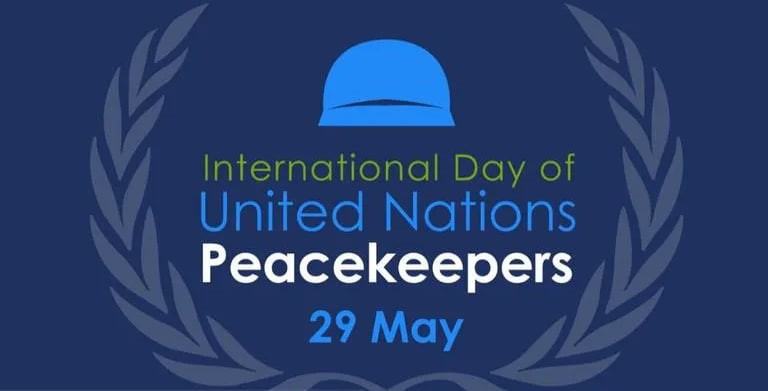
Copyright infringement not intended
Context: On May 29, the Indian Army observed the 75th International Day of UN Peacekeepers by paying tribute to fallen comrades by placing a wreath at the National War Memorial in New Delhi. On this day in 1948, the first United Nations peacekeeping mission, the "UN Truce Supervision Organisation (UNTSO)," commenced operations in Palestine.
Details
- On May 29th, 2023, the world celebrated the International Day of UN Peacekeepers, a day to honour the brave men and women who serve under the blue flag and risk their lives to protect civilians and promote peace in conflict zones.
- The theme of this year's commemoration is “Peace begins with me”.
UN peacekeeping operations
- The UN peacekeeping operations have been active since 1948 when the first mission was deployed to monitor the ceasefire in Palestine.
- Since then, more than one million peacekeepers from over 120 countries have participated in 72 missions around the world, making it one of the most successful and cost-effective tools for maintaining international peace and security.
- The role of peacekeepers has evolved from observing and reporting to protecting civilians, disarming combatants, supporting elections, facilitating humanitarian aid, and more.
- Peacekeepers also work closely with local communities, especially young people, to foster dialogue, trust, and reconciliation.
- The UN peacekeeping missions have been instrumental in helping countries transition from war to peace, by providing political, security, humanitarian and human rights support.
- They have also protected millions of civilians from violence, facilitated dialogue and reconciliation, and promoted sustainable development.
India and UN peacekeeping operations
- India has a long and distinguished history of contributing to UN peacekeeping operations since their inception in 1948.
- India is one of the largest troop contributors to UN peacekeeping with more than 200,000 personnel deployed in 49 of the 72 missions so far.
- India is also the second largest financial contributor to the peacekeeping budget after the US.
- India currently has around 5,900 troops deployed in 12 out of 16 active UN peacekeeping missions.
India's Role in UN Peacekeeping
- India's role in UN peacekeeping reflects its commitment to the principles of the UN Charter and its support for international peace and security.
- India has also been a strong advocate for reforming the peacekeeping architecture to make it more effective, responsive and representative of the changing global realities.
- India has proposed several initiatives such as increasing the participation of troop-contributing countries in decision-making, enhancing the safety and security of peacekeepers, providing better training and equipment, and ensuring greater accountability and transparency.
India's participation in UN Peacekeeping
- India's participation in UN peacekeeping also serves its national interests and foreign policy objectives.
- It enhances India's global image and reputation as a responsible and reliable partner.
- It provides valuable operational experience and exposure to its armed forces and police personnel.
- It also helps India to build goodwill and influence in regions of strategic importance such as Africa and Asia.
India also faces several challenges and risks in its involvement in UN peacekeeping
- The nature and complexity of conflicts have changed over the years, requiring more robust and multidimensional mandates for peacekeepers.
- The threats from armed groups, terrorists, criminals and spoilers have increased, resulting in more casualties and injuries among peacekeepers.
- The expectations and demands from the host countries, local communities and the international community have also grown, putting more pressure on the resources and capabilities of peacekeepers
India needs to adopt a proactive and pragmatic approach to address these challenges and leverage its strengths in UN peacekeeping. Some of the possible steps that India can take are:
- Strengthening its coordination and cooperation with other major troop-contributing countries such as Bangladesh, Pakistan, Ethiopia and Rwanda to share best practices, lessons learned and common concerns.
- Expanding its contribution of specialized units such as engineering, medical, aviation, logistics and female personnel to meet the emerging needs and gaps in UN peacekeeping.
- Enhancing its training and capacity-building assistance to other developing countries that aspire to join or increase their participation in UN peacekeeping.
- Advocating for a more equitable distribution of leadership positions and recognition for its peacekeepers at the UN headquarters and field missions.
- Promoting a more inclusive and consultative approach to peacebuilding and sustaining peace that involves all stakeholders such as regional organizations, civil society, women and youth.
Conclusion
- India has a vital role to play in UN peacekeeping as a leading democracy, a rising power and a trusted partner. By continuing its active engagement and constructive contribution to UN peacekeeping, India can uphold its values, interests and aspirations on the global stage.
Must Read Articles:
United Nations Peacekeeping Missions: https://www.iasgyan.in/daily-current-affairs/united-nations-peacekeeping-missions
|
PRACTICE QUESTION
Q. India has been one of the largest contributors to UN peacekeeping operations since their inception in 1948. What are the main challenges and opportunities for India in its continued engagement with UN peacekeeping operations? How can India leverage its experience and expertise to enhance its global profile and influence?
|

https://pib.gov.in/PressReleasePage.aspx?PRID=1928025




